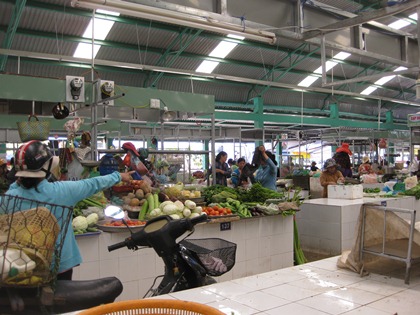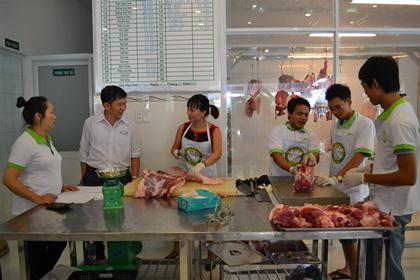
There are 166 active markets within planning
* Focusing on the inspection of food safety and
hygiene at markets
According to a report by the provincial Department
of Industry and Trade, in 2018 Binh Loi market in Vinh Cuu district and Tan Hanh
market in Bien Hoa city were upgraded. In addition, Dau Giay and Tan Lap
markets in Thong Nhat district and Vinh An market in Vinh Cuu were upgraded and
repaired with a fresh food area with a total amount of VND1.2 billion from the
funding of LIFSAP project. Up to now, 41 markets in the province have invested
in a fresh food area that receives the assistance from LIFSAP project and 1
market with the investment capital from the Ministry of Industry and Trade under
the pilot market model to ensure food safety and hygiene.
To ensure food safety in markets, the province has
set up food safety inspection teams in markets. Up to now, the province has
established 97 food safety inspection teams, accounting for 58.43%. The
inspection team has disseminated propaganda contents to the households doing
business in markets to ask them to comply with the introduction of fresh and raw
food into markets; offer guidance on the measures of selling, transporting and
preserving food in the business process; notify the list of local
slaughterhouses meeting food safety and hygiene standards for business
households to contact to get information and goods for trading; inspect meat,
fish, vegetables, fruits, and so on being sold in markets, thereby detecting and
promptly handling the business cases that have not complied with the business of
cattle and poultry meat that have not gone through control and quarantine of
veterinary agencies to ensure food safety and hygiene. In 2018, inspection teams
conducted and coordinated with concerned agencies to conduct 909 tests, and take
577 quick test samples. As a result, 30 households violated the regulations for
trading food products with unknown origins, and meat products without any
quarantine stamps; 23 food samples with borax. Also, 48 food samples were tested
for excessive nitrate residues. The total fines of administrative violations
were nearly VND34 million, 12.5 kg of yellow noodles, cha lua, cha ca, banh Su,
10 kg of fried onions and 5 kg of pork and so on were confiscated and destroyed,
contributing to improving efficiency to ensure food safety and hygiene in
markets, preventing poisoning cases.
Particularly, in 2018 Department of Industry and
Trade took the lead in its coordination with concerned departments, sectors,
localities and units to open 53 points of selling safe food products (including
40 points of selling meat and 13 points of selling vegetables) in 8 markets in 5
districts: Trang Bom, Thong Nhat, Tan Phu, Long Khanh town and Bien Hoa city in
the form of a safe food product supply chain. Up to now, the provincial
Department of Industry and Trade has established 99 safe food product selling
points in 12 markets in the 5 above districts.

It is necessary to continue establishing safe food
locations in the market in the form of a chain of traceability
In addition, the operation of the Food Safety
Inspection Group in markets is still faced up with a lot of weaknesses or lacks
specialized means and tools for food inspection and testing. The awareness of
business people is not poor, and buyers still love to buy low price products but
have not focused on the quality of goods, food safety and hygiene, and so on
resulting in the difficulties in the management of food safety and hygiene in
markets.
To overcome this issue, Deputy Director of the
provincial Department of Industry and Trade Le Van Loc said, the Department has
proposed the Provincial People’s Committee to assign itself to continue the
establishment of safe food selling points in markets in the form of
traceability.
* It is difficult to manage spontaneous markets
According to Dong Nai Department of Industry and
Trade, in the past years the Department of Industry and Trade and localities
have paid attention to dealing with the province’s spontaneous business
locations. However, spontaneous business locations occupying pavements for doing
business have still appeared and tended to increase, especially in localities
with industrial parks or in the areas crowded with workers.
Along the roads near industrial parks or the areas
crowded with workers, we can easily come across many spontaneous markets selling
vegetables, meat and fish that are displayed into roads which are mostly
occupied by these markets. As functional forces come, sellers move their
products close to the sidewalk but keep displaying their products back into
roads after functional forces leave.
Ms. Nguyen Thi Yen, a worker in Ho Nai industrial
park, Long Binh ward, said: “When I get home from work, I do not have much time.
So I buy food at spontaneous markets near my industrial park and this is very
convenient. Though I know food products do not have a clear origin, I am
attracted by cheap prices.”
Deputy Director of the provincial Department of
Industry and Trade, 9 spontaneous markets in the province including 5 in Bien
Hoa city, 1 in Long Thanh district, and 3 in Nhon Trach district were removed in
2018. However, there are about 100 active spontaneous markets in the province
due to the fact that some localities have not followed rules strictly enough
together with many people’s habit of buying things anywhere and anytime. Also,
spontaneous business households hire the space inside or in front of front
houses to do business, which has made it more difficult for functional forces to
deal with problems.
Duy Minh (N. Lan)